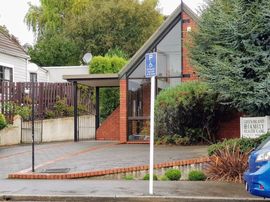Dunedin - South Otago > GPs / Accident & Urgent Medical Care > WellSouth Primary Health Network >
Green Island Family Healthcare
General Practice (GP) Service
Today
Description
We are a general practice aiming to provide quality healthcare to you and your family.
Consultations are by appointment only.
Doctors
-

Dr Margaret Pasek
General Practitioner - Vocationally Registered
-

Dr Stephen Searle
General Practitioner - Vocationally Registered
-

Dr Lilian Van Alphen
General Practitioner - Vocationally Registered
-

Dr Sharyn Willis
General Practitioner
Enrolling new patients
Fees
Enrolled Patient Fees
| Age Range | Without CSC | With CSC |
|---|---|---|
| Under 6 years | Free | Free |
| 6 to 13 years | Free | Free |
| 14 to 17 years | $30.00 | $10.00 |
| 18 to 24 years | $65.00 | $19.50 |
| 25 to 44 years | $65.00 | $19.50 |
| 45 to 64 years | $65.00 | $19.50 |
| 65+ years | $65.00 | $19.50 |
Hours
| Mon – Fri | 9:00 AM – 5:30 PM |
|---|
After Hours: Dunedin Urgent Drs & Accident Centre if between 8:00 AM - 10:00 PM. Otherwise, Dunedin Hospital ED
Public Holidays: Closed Good Friday (18 Apr), Easter Sunday (20 Apr), Easter Monday (21 Apr), ANZAC Day (25 Apr), King's Birthday (2 Jun), Matariki (20 Jun), Labour Day (27 Oct), Waitangi Day (6 Feb).
Preferred urgent care clinic out of hours: Dunedin Urgent Doctors & Accident Centre.
Languages Spoken
English
Services Provided
Health screening tests check for health conditions or early warning signs of disease.
Health screening tests check for health conditions or early warning signs of disease.
- Cervical screening
Health screening tests check for health conditions or early warning signs of disease.
Immunisation is the safest and most effective way to provide protection for you and your tamariki’s health. For more information view the NZ immunisation schedule.
Immunisation is the safest and most effective way to provide protection for you and your tamariki’s health. For more information view the NZ immunisation schedule.
Immunisation is the safest and most effective way to provide protection for you and your tamariki’s health. For more information view the NZ immunisation schedule.
All women and people with a cervix aged 25 – 69 who have ever had intimate skin-to-skin contact or been sexually active should have regular cervical screening. This includes women who have been immunised against HPV. Together, regular screening and HPV immunisation provide the best protection against cervical cancer. There are now more options for how you have cervical screening done: a simple vaginal swab test for HPV, either done yourself or with help from a healthcare professional a cervical sample taken by a healthcare professional (used to be known as a smear test). Talk with your healthcare provider to decide which option is best for you. If HPV is found, you may need to have a follow-up test or be referred directly for colposcopy. If you’ve not yet had HPV testing, you should be screened 3 years after your last test (or 1 year if immune deficient). Once you have had an HPV test, and providing HPV is not found, your next screening will be in 5 years (or 3 years if immune deficient). For more information: Cervical screening | Time to Screen - National Screening Unit
All women and people with a cervix aged 25 – 69 who have ever had intimate skin-to-skin contact or been sexually active should have regular cervical screening. This includes women who have been immunised against HPV. Together, regular screening and HPV immunisation provide the best protection against cervical cancer. There are now more options for how you have cervical screening done: a simple vaginal swab test for HPV, either done yourself or with help from a healthcare professional a cervical sample taken by a healthcare professional (used to be known as a smear test). Talk with your healthcare provider to decide which option is best for you. If HPV is found, you may need to have a follow-up test or be referred directly for colposcopy. If you’ve not yet had HPV testing, you should be screened 3 years after your last test (or 1 year if immune deficient). Once you have had an HPV test, and providing HPV is not found, your next screening will be in 5 years (or 3 years if immune deficient). For more information: Cervical screening | Time to Screen - National Screening Unit
All women and people with a cervix aged 25 – 69 who have ever had intimate skin-to-skin contact or been sexually active should have regular cervical screening. This includes women who have been immunised against HPV. Together, regular screening and HPV immunisation provide the best protection against cervical cancer.
There are now more options for how you have cervical screening done:
- a simple vaginal swab test for HPV, either done yourself or with help from a healthcare professional
- a cervical sample taken by a healthcare professional (used to be known as a smear test).
Talk with your healthcare provider to decide which option is best for you.
If HPV is found, you may need to have a follow-up test or be referred directly for colposcopy.
If you’ve not yet had HPV testing, you should be screened 3 years after your last test (or 1 year if immune deficient). Once you have had an HPV test, and providing HPV is not found, your next screening will be in 5 years (or 3 years if immune deficient).
For more information: Cervical screening | Time to Screen - National Screening Unit

Contact Details
20 Shand Street, Green Island, Dunedin
Dunedin - South Otago
-
Phone
(03) 488 2222
Healthlink EDI
greenfhc
Email
20 Shand Street
Green Island
Dunedin
Otago 9018
Street Address
20 Shand Street
Green Island
Dunedin
Otago 9018
Was this page helpful?
This page was last updated at 11:09AM on March 6, 2025. This information is reviewed and edited by Green Island Family Healthcare.
